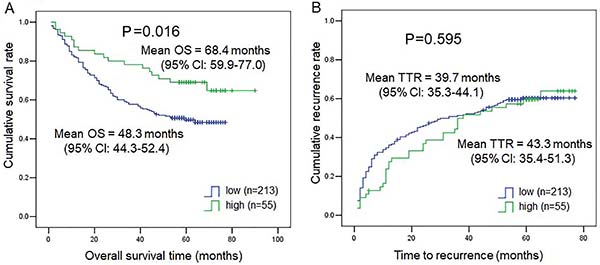This study aimed to explore the prognostic role of dipeptidyl peptidase 4 (DPP4) expression in hepatocellular carcinoma (HCC). DPP4 expression was measured in formalin-fixed paraffin-embedded specimens that were gathered from 327 HCC patients. Immunohistochemistry analyses were utilized to examine DPP4 expression characteristics and prognostic values (overall survival (OS) and time to recurrence) of DDP4 in HCC tissues. In addition, a patient-derived xenograft (PDX) model was used to assess the correlation between DPP4 expression and tumor growth in vivo. DPP4 was expressed in low levels in HCC tissues in contrast to paired peritumoral tissues (38 cases were down-regulated in a total of 59 cases, 64.4%. P=0.0202). DPP4 expression was significantly correlated with TNM stage (P=0.038), tumor number (P=0.035), and vascular invasion (P=0.024), and significantly reduced in patients who were in TNM stages II and III-V, with multiple tumors, and with microvascular invasion compared to patients with TNM stage I, single tumor, and no microvascular invasion. Notably, HCC tissues with low expression of DPP4 had poor OS (P=0.016) compared with HCC tissues with high expression of DPP4, and results from PDX model showed that tumor growth was significantly faster in HCC patients that lowly expressed DPP4 compared to those with highly expressed DPP4. Our findings suggested that low levels of DPP4 could impact the aggressiveness of HCC and contribute to a poor prognosis.
Dipeptidyl peptidase 4; Hepatocellular carcinoma; Immunohistochemistry; X-tile; Overall survival; Patient-derived xenograft

 Thumbnail
Thumbnail
 Thumbnail
Thumbnail
 Thumbnail
Thumbnail
 Thumbnail
Thumbnail



